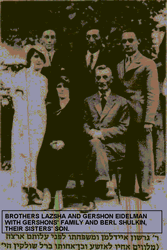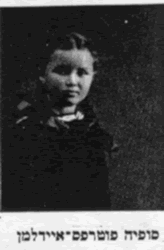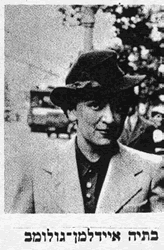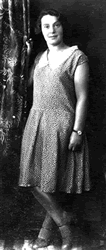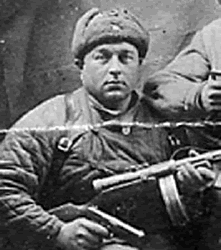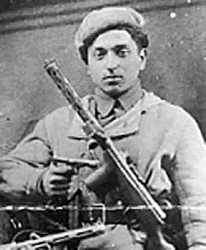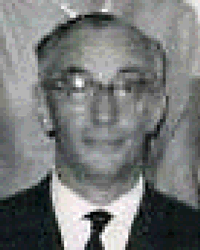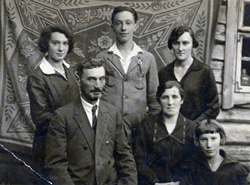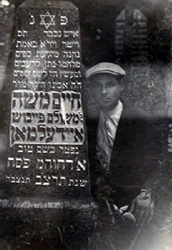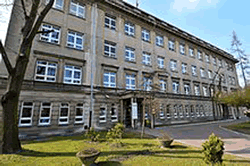Eidelman Family
Click on Photos to Enlarge
#eid-1
#eid-2
#eid-3:
#eid-4
Sima was born in Dolhinov in 1908 to Rhoda and Gershon Eidelman she
passed away in Raanana in 2001.
#eid-5
Fiebe Ejdelman
was born in Horodok. During the holocaust he escaped and joined the partisans to fight the nazis. Passed away in Israel in 1990.
#eid-6
Jacob/ Yaakov Ejdelman/ Eidelma was born in Horodok. During the holocaust he escaped and joined the partisans to fight the nazis.
After the war he came to Israel. He gave many pictures to this site.
#eid-7
Dov Adin was born in Dolhinov in 1914 to Rhoda and Gershon Eidelman.
he was one of the editors of the Dolhinov Yizkor book. he passed away
in Israel in 2001.
#eid-8
Gershon was born in Dolhinov in 1876 to Berl and Chaya Edelman. He
passed away in israel in 1947.
Here he is with his wife Rhoda Edelman
and children; Sonya Sara Shifris (1909- 2001); Dov Adin 9 1914-
2001); Frieda Ben-Tovim (1919- 2012) and Sima Ravkaie (1908- 2001)
#eid-9
#eid-10
#eid-11
Chatzkol Ejdelma ( perished in the holocaust) at the tombstone of his father; Chaim Moshe ben ( son of) Meshulam Fayvel Ejdelman/ Edelman. This was taken in Horodok/Gorodok ( in the mid 1930s) submitted by Scott Edelman.
I spoke with Yaakov Eidelman of 20/41 Moshe Sharet Street, Kiryat yam, Israel .
Yaakov was born in Horodok in 1924. He is the youngest son of Gdalyahu (son of Yaakov and Chaia Eidelman) and Zelda ( Daughter of Ben Zion and Rachel Malishkevitz ). His siblings; Feiva Eidlman was born in 1911.
Rachel Eidelman was born in 1913. She was married to Tzvi Shapira and had a daughter; Rivale, born a few years before the war. Chaia Eidelman was born in 1917. Hesel Eidelman was born in 1919. Hesel was the pride of the family. He was smart and a good student. He was also strong and good-looking. He studied in the Mir Yeshiva and was a very devout Jew.
The Eidelman family was a large family in Horodok. A sister of Gdalyahu as well as two brothers, left Horodok c 1911 and settled in America. Recently, Yaakov found a daughter of one of the brothers; Ida Shapiro of Tennessee.
There was also a brother; Israel who lived with his family in Horodok. A sister of Gdalyahu married a brother of his wife; Chaim Leib Malskevitz. They lived in Horodok. Another sister; Rivka, married Burl Leibovitz and had; Chaim and Mula ( born c 1912) and then Feibe, Gdalya and Chaia.
Gdalyahu was a dealer of horses and livestock. There were about 350 Jewish families in Horodok. Yaakov felt good growing up in Horodok. The Jews were in control of the shtetl. The non Jews seemed a bit fearful of them and did not start fights. The Jewish kids went to “Tarbut’ school, were most subjects were instructed in Hebrew. The teachers he remembers are Izkovitz, Segal, Avraham and the “Rabbi”. In the movie that was made by the Shapiro family who came from America ( c 1932) you could see Yaakov and his friend from the Tarbut school wearing the blue uniform shirts and the hats with the seven corners. He also recognized his first cousin, Feive Leibuvitz who perished ( from the entire leibovitz family only the father survived in Sibiria).Yaakov graduated after seven grades and started studying in a Yeshiva shortly before the war started. In September of 1939 Germany attacked Poland. In a short time the polish army was defeated. There was a period of great fear and confusion. When the Jews of Horodok heard that the Soviets are taking over the north east regions of Poland- many sighed with relief.
They knew that they will suffer economically but they felt that physically they were safe. Yaakovs’ brother who was with the Mir Yeshiva- moved to Independent Lithuania ( Shavli) in Lithuania the Yeshiva could continue the studies. Eventually the Yeshiva transferred to China on the way to the U.S.. Hesel was not with the rest of the Yeshiva students. Together with Kur he returned to Horodok, not wanting to live in China were he felt that he could not find Kosher food. Only Yisrael Shparber of both Horodok and Mir came to China and from there to the U.S….
As the Soviets arrived they closed the Tarbut school and people who owned private stores ( most of the Jews) had to form cooperatives or find other jobs. Yaakov attended night classes to learn Russian. Some Jews were sent to Siberia. Amongst them were Leibovitz adult males. His uncle; Berl Leibovitz and his two oldest sons; Chaim and Mula….
On Sunday, June 22nd. 1941 Germany attacked Russia. No one in his worst nightmare could conceive that in a few days- on Wednesday the 25th of June the Germans would already be in Horodok. His uncles family ( Chaim Leib Malishkevitz) left Horodok on horse and buggy only to find that it was too late. The Germans were already farther east, in Minsk, and they had to return.
Shortly after they arrived the Germans collected all the Jews of Horodok. They had them stand in the center of town for many hours without food and drinks. After many hours they were told that they lost all rights of being human. They are not to walk on the sidewalks, they are not to talk to non-Jews, they are not to leave town or walk in-groups of more then 3 . They are not to use any transportation. They are not to be outdoors at nights, and so on…- anyone who is found to be doing so would be immediately killed. From now on they will have to wear Yellow stars on the front and back and be slaves to the Germans and their collaborators. From this day the Jews felt like animals who are hunted. Yakkov felt under great depression and slept continuously for many days. Eventually he had to go to work for the Germans (as the rest of the Jewish men). Since Horodok had no industry, the Jews were sent to fix roads in the region. Since the Jews knew clearly that the day of the liquidation of the community will come soon they started arranging hiding places and made deals with some non Jewish neighbors. They gave them large sums of money and possessions. In return the non Jews promised to help them after they escaped.
In the summer of 1942 Yaakov was taken with a group of about 17 young men from Horodok to the Krasne camp.
The Krasne camp was a forced labor camp near Horodok. A few weeks after Yakkov left the Horodok ghetto was liquidated. Most families ran to their hiding places but most hiding places were discovered and the people were killed. The aunts family was discovered hiding in the Eidelman’ barn, when they refused to come out grenades were thrown and they were all killed. Yaakovs’ parents and brothers were hiding in the basement- their place was not discovered and after a few days they were able to escape and hid in the Krasne camp. Yisrael Maeizel gave large sums of money to a non Jewish neighbor but when he escaped and came to his house the man killed him ( Yisrael Meizels’ brother lives in the U.S) .Yaakov knew that the days of the Krasne camp were also numbered. He heard that the resistance force arrived to the area and established partisan camps in the area. He very badly wanted to join the fight. Twice he escaped from the Krasne camp. The first time he was able to get in touch with the Soviet partisans but they would not take him without weapon. The second time he escaped with Mirim Draboskin ( later of Ashkelom , Israel). A farmer Mirim knew gave them weapons in exchange for large sums of money. Yaakov joined the “Soviestko Belarus” and took part in many important missions. He became known for his bravery. Shortly before the Krasne camp was liquidated Yaakov ‘ brother Feive, his sister; Chaia and two other people ( Hesel refused to go with them, wanting to keep Kosher) ( Eizar Rabinovitz? Later joined the partisans and was killed fighting the Germans) escaped from the Krasne camp. While the sister was waiting Feive went to obtain weapon and find a unit of partisans to join. Since there were many in the Krasne camp who were sick with typhus when the partisans met with Feive they had an order to kill him so illnesses would not be spread. They told him to split and never show his face in this area. The sister meanwhile returned to the camp. It was 3 days before Purim of 1943. The next day the camp was liquidated and all but Yaakov and Feive perished. Feive joined the Zakalov Otriad to fight the Germans.
In the summer of 1944 Belarus was liberated. Yaakov took pert in the march of the Partisans in Minsk. Feive immediately joined the Red Army to fight the Germans in the west. Yaakov and other elite soldiers from the partisans were chosen for a special unit to clear the forests of Belarus. Now the Germans and their collaborators replaced the partisans and Jews and they were in hiding. Sometimes later Yaakov lived in Volozhin with other surviving Jews from the area. He received a letter that his brother was wounded. Yaakov became greatly disturbed, he lost the will to survive. He joined the red Army and was sent to learn driving tanks and other machines. In 1945 he took part in the victory parade in Moscow and drove his tank right by Stalin who greeted him. Shortly after he had a visitor; it was his cousin, Feive Eidelman ( there were 3 Feive Eidelmans in Horodok)- Feive lives in the U.S this days. Later Yaakov found out this his brother; Feive also survived and he now lives in Volozhin. Yaakov was still in the Red Army in the area of Moscow. He was in the airforce in a transportation unit. In 1947 He received two weeks leave and visited his brother in Volozin. In `1948 he was done with his service. He moved with his brother to Minsk. Here they were able to make a good living. Feive married Rachel nee Alterman of Horodok and had two sons ( his son Natan lives in Rishon Lezion) . Yaakov married Raia Kanter of Minsk ( she was in the Soviet Union during the war) They had a daughter in Minsk. More then 100 people survived from Horodok. Most of them left the Soviet Union for Israel via Poland. since they were former Polish citizens most were permitted to go to Poland ( unless they knew secretes of the Soviets) . Yakkov and his family were able to bring their possessions to Poland.
They came with a car and a motorcycle. When they arrived in Poland they sold their possessions and took a plane to Israel. They were placed in a immigrant community in Tiveon. Feive came with his family by boat. They wanted to place the family in Beer Sheva. Yaakov arranged for Feive to live near him in Tiveon. Yaakov did well in Israel. After a short time he was able to buy a route of delivery for Tnuva co-operative specializing in Dairy products.
Yaakov is involved with others who survived from the area. With Ytzhak Regev of Acco ( nee Rogovin) who was also an heroic partisan, they submitted to Yad vashem a list of all the families of Horodok who had no survivors to submit such reports. .
Reports by Yaakov to Yad vashem in 1994;
His father; Gdaljau Ejdelman was born in Horodok, in
1885 to Yaakov and Khaia. He was married to Zelda nee Malashkevitz...
His mother;
Zelda Eidelman nee Malashkevitz was born in Horodok, Poland in 1888 to
Bentzion and Rakhel his brother and sisters; Hesel Eidelman was born in
Horodok, Poland in 1919 to Gdaliau and Zelda -Rakhel Ejdelman was born in
Horodok, Poland in 1913 to Gdaliau and Zelda . She was married to Tzvi
Shapira.-Khaia Ejdelman was born in Horodok, Poland in 1917 to Gdaliau and Zelda
his fathers' sister; Rivka Libovich nee Ejdelman was born in Horodok,
Poland in 1879 to Yaakov and Khaia. She was married to Berl his cousin;
Feiva Libovitz was born in Horodok, Poland in 1907 to Rivka nee
Eidelman. Prior to WWII he lived in Horodok Gdaliahu Libovitz was born
in Horodok, Poland in 1910 to Rivka Eidelman. He was single Khaia
Perevozkin nee Libovitz was born in Horodok, Poland in 1909 to Rivka nee
Eidelman. She was married to Mirim his fathers' brother; Israel Ejdelman
was born in Horodok, Poland in 1883 to Yaakov and Khaia. He was married.
Prior to WWII he lived in Horodok, Poland.
During the war was in Horodok, Poland. Israel died in 1943 in Krasne,
Poland at the age of 60. This information is based on a Page of
Testimony submitted on 01/01/1994 by his nephew.
The wife of his fathers' brother;
Shula Ejdelman nee Malashkevitz was born in Horodok, Poland in 1885.
She was married to Israel
His cousins;
Yaakov Ejdelman was born in Horodok, Poland in 1923 to Israel and Zelda.
He was single. Prior to WWII he lived in Horodok, Poland.
During the war was in Horodok, Poland. Yaakov died in 1941 in Horodok,
Poland at the age of 18.
David Ejdelman was born in Horodok, Poland in 1928 to Israel and Shula.
He was a child.
Faive Ejdelman was born in Horodok, Poland in 1917 to Israel and Shula.
He was single. Prior to WWII he lived in Horodok, Poland.
During the war was in Army, Ussr. Faive died in the Shoah Simon Ejdelman
was born in Horodok, Poland in 1913 to Israel and Shula. He was single.
Prior to WWII he lived in Horodok, Poland.
Marek Edelman
From Wikipedia, the free encyclopedia
Marek Edelman
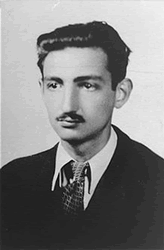
Marek Edelman at around the time
of the Warsaw Ghetto Uprising
Born
1919 or 1922[1]
Uncertain—Homel or Warsaw[1]
Died
October 2, 2009[1]
Warsaw, Poland
Allegiance
General Jewish Labour Bund
?ydowska Organizacja Bojowa
Armia Ludowa
Years of service
1942–1944
Rank
Deputy commander (?OB)
Battles/wars
Warsaw Ghetto Uprising
Warsaw Uprising
Awards
French Legion of Honor[1][2]
Order of the White Eagle[1]
Yale University, honorary doctorate[1]
Marek Edelman (Yiddish: ?????? ????????, born 1919 in Homel[3] or 1922 in Warsaw – October 2, 2009 in Warsaw)[1] was a Jewish-Polish political and social activist and cardiologist. Before his death in 2009, Edelman was the last surviving leader of the Warsaw Ghetto Uprising.
Before World War II, he was a General Jewish Labour Bund activist. During the war he co-founded the Jewish Combat Organization (?OB). He took part in the 1943 Warsaw Ghetto Uprising, becoming its leader after the death of Mordechaj Anielewicz. He also took part in the city-wide 1944 Warsaw Uprising.
After the war, Edelman remained in Poland and became a noted cardiologist. From the 1970s, he collaborated with the Workers' Defence Committee and other political groups opposing Poland's communist regime. As a member of Solidarity, he took part in the Polish Round Table Talks of 1989. Following the peaceful transformations of 1989, he was a member of various centrist and liberal parties.[4] He also wrote books documenting the history of wartime resistance against the Nazi German occupation of Poland.
Early life
Details of Marek Edelman's birth are not known for certain; sources give two possible dates of birth, either 1919 in Homel,[3][5] or in 1922 in Warsaw.[6] His father, Natan Feliks Edelman (died 1924), was a member of the Socialist Revolutionary Party (his father's brothers, also Socialist Revolutionaries, were executed by the Bolsheviks).[3] His mother, Cecylia Edelman (died 1934), a hospital secretary, was an activist member of the General Jewish Labour Bund, a Jewish socialist workers' party.[3] After Edelman's mother died when he was 14, he was looked after by other staff members at the hospital where she had worked in Warsaw, the city he always called home.[7] He said in 2001: "Warsaw is my city. It is here that I learned Polish, Yiddish and German. It is here that at school, I learned one must always take care of others. It is also here that I was slapped in the face just because I was a Jew."[7]
As a child, Edelman was a member of Sotsyalistishe Kinder Farband (SKIF), the Jewish Labour Bund's youth group for children.[8] In 1939 he joined and became a leader in Tsukunft ("Future"), the Bund's youth organization for older children.[9] During the war, he restarted these organizations inside the Warsaw Ghetto.[10] The defiance and organization of the Bund made their mark on Edelman. As conditions for Jews worsened in the 1930s, Bund members preferred to challenge the mounting antisemitism rather than flee. Edelman later said: "The Bundists did not wait for the Messiah, nor did they plan to leave for Palestine. They believed that Poland was their country, and they fought for a just, socialist Poland in which each nationality would have its own cultural autonomy, and in which minorities' rights would be guaranteed."[7]
World War II
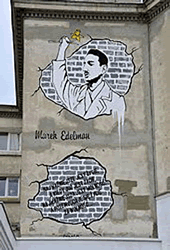
Mural in memory of Marek Edelman at 9b Nowolipki Street in Warsaw.
"The most important is life, and when there is life, the most important is freedom. And then we give our life for freedom..."
In 1939, after the German invasion of Poland Edelman found himself confined—along with the other Jews of Warsaw—to the Warsaw Ghetto. In 1942, as a Bund youth leader he co-founded the underground Jewish Combat Organization (?ydowska Organizacja Bojowa, ?OB). In the Warsaw Ghetto Uprising of April–May 1943, led by Mordechaj Anielewicz, Edelman was one of the three sub-commanders and then became the leader after the death of Anielewicz.[11]
When the Germans had stopped their campaign of transporting Ghetto residents to Treblinka extermination camp in September 1942, only 60,000 had remained.[7] Edelman and his comrades, however, had had little doubt that the Germans would resume the job. The Jewish Combat Organisation had begun acquiring weapons and organizing into units that would make up for lack of training and munitions with an intimate knowledge of the Ghetto, both above ground and in its sewer network.[7]
The Germans resumed their attack on the Ghetto on 19 April 1943 with over 2,000 troops. According to Edelman: "The Germans weren't expecting resistance of any kind, let alone that we would take up arms." The outnumbered and outgunned Ghetto fighters' strong resistance forced the German troops to withdraw.[7] It was on the second day of the Uprising, while protecting the retreat of Edelman and other comrades, that another prominent insurgent and Bundist, Micha? Klepfisz, was killed.[12] Over the next three weeks, the fighting was intense. The Jewish fighters killed and wounded scores of Nazis but inevitably sustained far greater losses. On May 8, ?OB's commander, Mordechaj Anielewicz, was surrounded by German forces. He committed suicide, which meant that now Edelman was in charge. "After three weeks," he recalled, "most of us were dead."[7]
The Germans proceeded to flush out the few remaining fighters by burning down the Ghetto - Edelman always insisted, "We were beaten by the flames, not the Germans."[7] At that juncture, couriers from the Polish underground outside the Ghetto came through the sewers that still linked it with the rest of Warsaw. On the morning of May 10, Edelman and his few remaining comrades escaped through the sewers and made their way to the non-Ghetto part of Warsaw to find safety among their Polish compatriots. At this point the Uprising was over and the fate of those fighters who had remained behind is unknown.[7]
After World War II, the Ghetto Uprising was sometimes given as an unusual instance of active Jewish resistance in the face of the horror perpetrated by the Germans. However, Marek never saw a difference in the character of those who fought in the Uprising and those who were sent to the death camps, as, in his view, all involved were simply dealing with an inevitable death as best as they knew how.[7]
"We knew perfectly well that we had no chance of winning. We fought simply not to allow the Germans alone to pick the time and place of our deaths. We knew we were going to die. Just like all the others who were sent to Treblinka.... Their death was far more heroic. We didn't know when we would take a bullet. They had to deal with certain death, stripped naked in a gas chamber or standing at the edge of a mass grave waiting for a bullet in the back of the head.... It was easier to die fighting than in a gas chamber."[7]
In mid-1944, Edelman, as a member of the leftist Armia Ludowa (People's Army), participated in the city-wide Warsaw Uprising, when Polish forces rose up against the Germans before being forced to surrender after 63 days of fighting.[13] After the capitulation, Edelman together with a group of other ?OB fighters, hid out in the ruins of the city as one of the Robinson Crusoes of Warsaw before being rescued and evacuated with the help from the centrist Armia Krajowa (Home Army).[14]
Later life
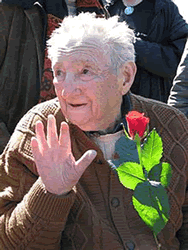
Specialized District Hospital named after Nikolay Pirogov in ?ód? where Marek Edelman worked as cardiologist for over 30 years
Edelman's hospital upbringing had proven invaluable in the Warsaw Ghetto. After World War II, he studied at ?ód? Medical School and became a noted cardiologist who invented an original life-saving operation.[11] In 1948 Edelman actively opposed the incorporation of the Bund into the Polish United Workers' Party (Poland's communist party), which led to the communists disbanding the organization.[15] In 1976, he became an activist with the Workers' Defence Committee (Komitet Obrony Robotników)[16] and later with the Solidarity movement. Edelman publicly denounced racism and promoted human rights.[11]
In 1981, when General Wojciech Jaruzelski declared martial law, Edelman was interned by the government.[13] In 1983, he refused to take part in the official celebrations of the 40th anniversary of the Warsaw Ghetto Uprising sponsored by Poland's communist government,[17] believing that this "would be an act of cynicism and contempt" in a country "where social life is dominated throughout by humiliation and coercion."[13] Instead, he walked with friends to the street where Mordechai Anielewicz's bunker had been located.[17] Edelman took part in the Round Table Talks as Solidarity's consultant on health policy.[13]
In post-communist Poland, Edelman was a member of several centrist liberal parties: the Citizens' Movement for Democratic Action, Democratic Union, Freedom Union and Democratic Party – demokraci.pl. He supported the 1999 NATO bombing of Yugoslavia as well as the 2003 Iraq war, both of which he saw as instances of American democracy saving countries from fascism again.[18][19][20] As an appointed Senator of the Republic, he lent public support to anti-fascist initiatives and to organisations combatting antisemitism. In 1993, he accompanied a convoy of goods into the city of Sarajevo while that city was under siege.[21] Edelman strongly condemned international indifference during the Bosnian Genocide in the early 1990s, calling it a disgrace for the rest of Europe and "a delayed victory by Hitler - a victory from the grave."[22][23] On 17 April 1998,[24] Edelman was awarded Poland's highest decoration, the Order of the White Eagle.[1] He also received the French Legion of Honour.[2]
Edelman was a lifelong anti-Zionist.[25][26][27] In a 1985 interview, he said Zionism was a "lost cause" and he questioned Israel's viability.[28] He remained firmly Polish, refusing to emigrate to Israel.[29] In old age, he spoke in defence of the Palestinian people, as he felt that the Jewish self-defence for which he had fought was in danger of crossing the line into oppression.[30] In August 2002, he wrote an open letter to the Palestinian resistance leaders. Though the letter criticised the Palestinian suicide attacks, its tone infuriated the Israeli government and press. According to the late British writer and activist Paul Foot, "He wrote [the letter] in a spirit of solidarity from a fellow resistance fighter, as a former leader of a Jewish uprising not dissimilar in desperation to the Palestinian uprising in the occupied territories."[31] He addressed his letter "To all the leaders of Palestinian military, paramilitary and guerilla organizations — To all the soldiers of Palestinian militant groups".[32] Moshe Arens, former Israeli Defence Minister and Foreign Minister, visited Edelman in Warsaw in 2005 to discuss the Warsaw Ghetto Uprising. Arens admired Edelman and tried unsuccessfully to gain official Israeli recognition for his heroism. Following Edelman's death, Arens recalled in Haaretz:
"Many of the survivors of the uprising who settled in Israel could not forgive Edelman for his frequent criticism of Israel. When on my return from Warsaw I tried to convince a number of Israeli universities to award Edelman an honorary doctorate in recognition of his role in the Warsaw ghetto uprising, I ran into stubborn opposition led by Holocaust historians in Israel. He had received Poland's highest honor, and at the 65th commemoration of the Warsaw ghetto uprising he was awarded the French Legion of Honor medal. He died not having received the recognition from Israel that he so richly deserved." — Moshe Arens [33]
Family life
Marek Edelman was married to Alina Margolis-Edelman (1922–2008). They had two children, Aleksander and Anna.[2][29] When his wife and children emigrated from Poland to France in the wake of antisemitic actions by the Polish communist authorities in 1968, Edelman decided to stay in ?ód?. "Someone had to stay here with all those who perished here, after all."[7] He published his memoirs, which have been translated into six languages.[29] Each April he laid flowers in Warsaw for those he had served with in the Warsaw Ghetto Uprising.[2] Edelman's wife Alina, likewise a Warsaw Ghetto survivor, died in 2008. They were survived by their son and daughter.[7]
Death
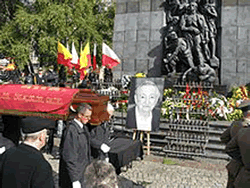
Edelman's funeral. In the background, Monument to the Ghetto Heroes
Edelman died, aged 90, on 2 October 2009.[2][11][34] He was buried in Warsaw with full military honours on 9 October 2009. His coffin was covered with a Bund banner inscribed "Bund - Yidisher Sozialistisher Farband," and a choir sang the Bund anthem, "Di Shvue."[35] The Polish President Lech Kaczy?ski and the former President Lech Wa??sa were present at the funeral, attended by about 2,000 persons.[36]
W?adys?aw Bartoszewski, former Polish Minister of Foreign Affairs and an Auschwitz survivor, led the tributes to Edelman, saying: "He reached a good age. He left as a contented man, even if he was always aware of the tragedy he went through."[11][34] Bartoszewski denied that the activist was "irreplaceable," before acknowledging that "there are few people like Marek Edelman."[11][34] Catholic Bishop Tadeusz Pieronek said: "I respect him most for the fact that he stayed in this land, which made him fight so hard for his Jewish and Polish identity. He became a real witness, he gave a real testimony with his life."[37] The former Polish Prime Minister, Tadeusz Mazowiecki, was also present and said Edelman had been a model for him.[36]
Former head of Israel's parliament and former Israeli ambassador to Poland Shevah Weiss said: "I'd like to offer my condolences to Marek Edelman's family, to the Polish nation and to the Jewish nation. He was a hero to all of us."[34] Ian Kelly, official spokesperson for the United States, expressed sympathies and affirmed that the United States "stands with Poland as it mourns the loss of a great man."[38]
From: Garry Stein <gstein888@yahoo.com>
To: egl.comments@gmail.com
Dear Eilat,
I have been using your site for some time now and wanted to write and thank you. It has been a true blessing to me in my work with Horodok and my Adelman/Edelman relatives.
I wondered if you could help me. I tried writing an email to Yaniv Ejdelman, grandson of Yaacov at rozyaniv@012.net.il and the email bounced. I wonder if you have any up to date information on him or his family.
I have been tracking several Adelman/Edelman lines linked to families in Canton, Ohio, USA. The all came around the same time and many lived next to each other in Canton. I am certain that there is a common relative and this can be tracked by using DNA testing. I am trying to locate direct mail descendants of each line and have such testing done (fairly inexpensive on ancestry). I will also contact Scott Edelman, who is mentioned on your site and whom I have communicated with periodically, and a few others that I am reaching out to.
Thanks so much for your site and appreciate any help you can give.
All the best,
Garry
Garry R. Stein (Hong Kong)
